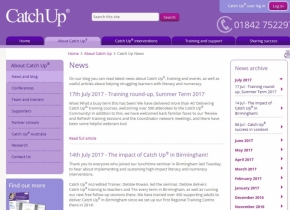
Request a full Catch Up® information brochure and details of our free information webinars
Find out more
Our blog and newsletters are designed to offer extra guidance and advice to support your work with struggling learners, whether you are using the Catch Up® interventions or not. We hope you enjoy reading them and find them useful. In case you missed anything, don’t forget you can access all of the blog archive here, and as a reminder, here are just a few of the ‘most read’ pieces from 2016-17!
1. Assess and progress!
2. Have you used the new Managing Catch Up videos yet?
3. Lynne’s logic: looking at addition and apparatus
4. The Catch Up Coordinator part 1: Why do we need one?
5. To point or not to point?
6. The Review and Refresh session – part of the package
Thank you to our office team and trainers who have written articles for us. Look out for lots more next term!
Catch Up® is the working name of The Caxton Trust, a not-for-profit charity registered in England and Wales (1072425) and Scotland (SC047557) as well as a company limited by guarantee (03476510). Catch Up is a registered trademark.
The Catch Up® Web site use "cookies" to help you personalise your online experience. A cookie is a text file that is placed on your hard disk by a Web page server. Cookies cannot be used to run programs or deliver viruses to your computer. Cookies are uniquely assigned to you, and can only be read by a web server in the domain that issued the cookie to you.
Click on the different category headings below to find out more. You can change your default settings very easily. To turn cookies on, click the button to the right. To turn cookies off, click the buttons to the left. Please read our cookie policy to find out more.
Performance monitoring cookies: Google Analytics cookies (_ga,_gid) - these can last up to 2 years.
Strictly necessary cookies used by the site content management system: PHPSESSID (used to record your logged in session) and allow_cookies (used to record that the user has consented to cookies) - these are either temporary (session) cookies or expire after no more than 30 minutes and are used to provide functionality as you navigate around the site and allow you to access secure areas.